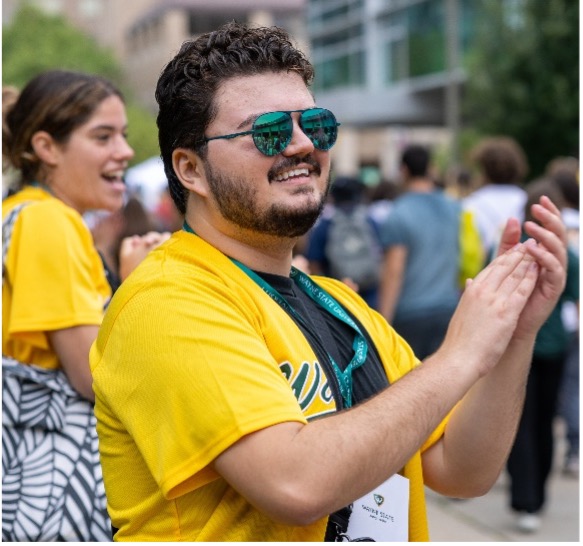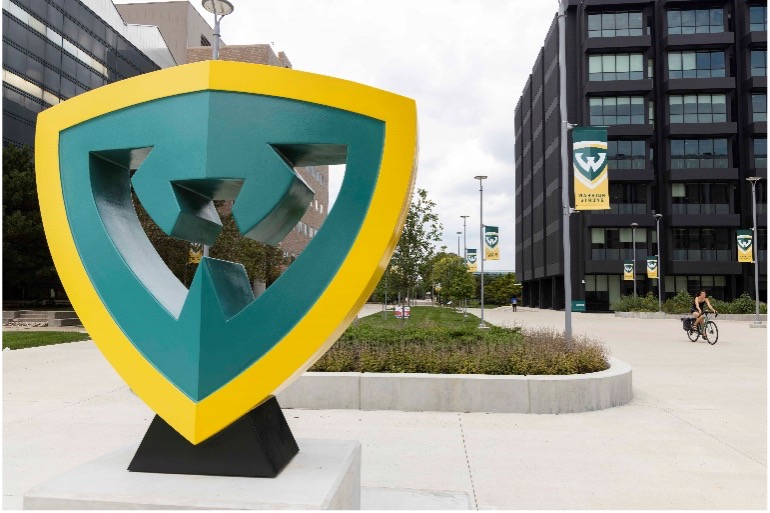Vice President for Enterprise Planning and Operational Excellence
Position profile
Wayne State University, a premier urban public Carnegie R1 research university in the heart of Detroit, a revitalized city on the move, seeks a collaborative leader who is a proactive communicator and tireless connector to serve as the inaugural Vice President for Enterprise Planning and Operational Excellence (VP).
Reporting directly to the President, the Vice President (VP) for Enterprise Planning and Operational Excellence provides vision and university-wide leadership in the development of systems and processes that will increase the efficiency and effectiveness of planning, analysis, reporting, and decision-making across administrative and academic divisions. In advancing the state of these activities across the university, the Vice President will play a formative role in creating new institutional capacity and will help leaders and managers allocate resources and measure the use of resource in ways that will increase operational efficiency, maximize return on investment, and guide future strategic planning for success.
The VP will play a leadership role in developing capacity, business practices, and systems that will enable new kinds of data-informed planning, decision support, and process modernization across the university. Assuming responsibility for enterprise technology services, developing tools and systems that will elevate business intelligence, and guiding the creation of institutional data strategy, the new Vice President will on many fronts help Wayne State pursue the goals and objectives established in its 2022-2027 strategic plan, Our Moment In Time.
Wayne State University
 Since its founding as a medical college in 1868, Wayne State University is Michigan’s only urban public research university located in the city of Detroit, playing a vital role in the education and health of Detroiters. Wayne State is designated as a Carnegie R1, doctoral-granting university with very high research activity. WSU has also achieved recognition for its efforts in the community by earning the Carnegie Community Engagement classification, as well as nationally through its designation as an Innovation and Economic Prosperity University by the Association of Public and Land-Grant University. The university is comprised of 13 schools and colleges: College of Education; College of Engineering; College of Fine, Performing and Communication Arts; Graduate School; Law School; College of Liberal Arts and Sciences; the Mike Ilitch School of Business; School of Information Sciences; Irvin D. Reid Honors College; School of Social Work; School of Medicine; College of Nursing; and the Eugene Applebaum College of Pharmacy and Health Sciences. As Detroit’s seventh-largest employer, Wayne State has 2,400 faculty members (1,400 full-time), more than 3,400 staff, and approximately 1,800 student and part-time employees.
Since its founding as a medical college in 1868, Wayne State University is Michigan’s only urban public research university located in the city of Detroit, playing a vital role in the education and health of Detroiters. Wayne State is designated as a Carnegie R1, doctoral-granting university with very high research activity. WSU has also achieved recognition for its efforts in the community by earning the Carnegie Community Engagement classification, as well as nationally through its designation as an Innovation and Economic Prosperity University by the Association of Public and Land-Grant University. The university is comprised of 13 schools and colleges: College of Education; College of Engineering; College of Fine, Performing and Communication Arts; Graduate School; Law School; College of Liberal Arts and Sciences; the Mike Ilitch School of Business; School of Information Sciences; Irvin D. Reid Honors College; School of Social Work; School of Medicine; College of Nursing; and the Eugene Applebaum College of Pharmacy and Health Sciences. As Detroit’s seventh-largest employer, Wayne State has 2,400 faculty members (1,400 full-time), more than 3,400 staff, and approximately 1,800 student and part-time employees.
Wayne State is the third largest among Michigan’s public universities, offering approximately 375 academic programs delivered by expert faculty. Wayne State serves approximately 24,000 students. Wayne State stands out as an institution of access and opportunity for students from all backgrounds and is proud of its status as Michigan’s most diverse public university with 16% of its students identifying as Black/African American, 15% as Asian, 10% as Middle Eastern/North African, and 7% as Hispanic or Latino. More importantly, 40% of its undergraduate population are first-generation college students and nearly half are Pell-eligible. In addition, Wayne State’s current student body includes students from 80 countries and the university’s global engagement effort has led to partnerships with institutions in the Middle East, Latin America, Europe, Korea, India, and China. Third Way rankings identify Wayne State as in its top tier for social mobility. Following their Wayne State experience, approximately 80% of alumni remain in Michigan, establishing the university as a significant talent pipeline for the region and a significant contributor to the state economy.
Serving the Detroit metropolitan region and the state of Michigan in its economic reinvigoration, Wayne State’s 200-acre campus lies in the heart of Midtown, a cultural and historic district in Detroit, and plays a critical role as a steadfast partner in the city’s economic life. In large part due to its unique positioning as Michigan’s only urban public research university, combined with its academic, research, and teaching excellence, Wayne State attracts students from across the state, nation, and beyond. With research expenditures exceeding $250.9M, Wayne State serves a prominent role in conducting research and furthering knowledge with a community impact. In addition, the university is a proud member of the University Research Corridor, along with the University of Michigan and Michigan State University, the only national innovation cluster composed exclusively of public institutions which generates 95% of statewide research and supports economic growth across Michigan.  In addition to Wayne State’s faculty being recognized for their research in chemistry, physics, biomedical and health sciences, mobility and automotive safety, neurosciences, alternative/sustainable energy, and nanoscience, the university has been named a top 100 public university by U.S. News & World Report. WSU is also ranked the No. 2 medical institution for research in Michigan and is home to a National Cancer Institute-designated Comprehensive Cancer Center, a top-ranked physician assistant program in Michigan, a Nurse Anesthesia program ranked in the country's top 20%, the Masters and Doctorate of Nursing Programs both in the top 50 in the country and the undergraduate nursing program ranked in the top 10% in the country by U.S. News & World Report.
In addition to Wayne State’s faculty being recognized for their research in chemistry, physics, biomedical and health sciences, mobility and automotive safety, neurosciences, alternative/sustainable energy, and nanoscience, the university has been named a top 100 public university by U.S. News & World Report. WSU is also ranked the No. 2 medical institution for research in Michigan and is home to a National Cancer Institute-designated Comprehensive Cancer Center, a top-ranked physician assistant program in Michigan, a Nurse Anesthesia program ranked in the country's top 20%, the Masters and Doctorate of Nursing Programs both in the top 50 in the country and the undergraduate nursing program ranked in the top 10% in the country by U.S. News & World Report.
Wayne State’s Prosperity Agenda
As an urban public research institution, Wayne State plays a unique and influential role in Detroit, preparing students for life-changing careers, advancing the health and well-being of its local communities, and contributing significantly to Michigan’s economic growth. Conceived through a close partnership between President Espy and Wayne State stakeholders, the university’s Prosperity Agenda sets forth a focused purpose to support Wayne State in making a prosperous future for all stakeholders a reality. Specifically, the Prosperity Agenda sets forth three cornerstone ideals:
- Accelerate Mobility for Our Students – We recognize the power of education to positively alter students' life trajectories, fostering generational change and societal advancement. We serve a diverse student body and provide access and success to underserved communities, supported by our top-tier faculty’s engaging teaching methods and “learning by doing” experiences that cultivate the competencies that prepare our graduates for successful careers.
-
 Empower Health for Our Urban Neighborhoods – Wayne State plays a vital role in the health of Detroiters, serving in all major Detroit health systems and providing care in local neighborhoods. By unleashing our faculty, students and university leaders to engage even further with our community, we can expand cutting-edge care and address health disparities to build healthier, more resilient neighborhoods in Detroit and beyond.
Empower Health for Our Urban Neighborhoods – Wayne State plays a vital role in the health of Detroiters, serving in all major Detroit health systems and providing care in local neighborhoods. By unleashing our faculty, students and university leaders to engage even further with our community, we can expand cutting-edge care and address health disparities to build healthier, more resilient neighborhoods in Detroit and beyond. - Fuel Innovation for Our Competitiveness – By fostering innovation and entrepreneurship, we strive to propel Michigan's competitiveness in 21st century commerce. Through the support of TechTown and by cultivating a campus that is “open for business,” we will create more solutions to the challenges endemic to urban areas and ensure a robust economy that benefits all.
Wayne State’s Prosperity Agenda serves as an organizing framework to guide the university toward achieving the goals set forth in the strategic plan, Our Moment in Time, and provides a shared focus on bettering the lives of students, supporting faculty in pushing the boundaries of knowledge and innovation further, and strengthening the bonds that interconnect Wayne State and the community it serves.
President Kimberly Andrews Espy
Dr. Kimberly Andrews Espy was appointed the 13th president of Wayne State University in August 2023. A leader with more than 25 years of experience in higher education, President Espy previously served as Provost and Senior Vice President for Academic Affairs at the University of Texas at San Antonio (UTSA). Since her arrival, she has embraced Wayne State’s urban-serving, public research university mission through engagements with students, faculty, staff, community, alumni, and governmental stakeholders.
During her tenure at UTSA, President Espy championed social and economic opportunity by promoting affordable access to a top-quality research university education, moving UTSA to a Carnegie R1 classification, joining the Alliance of Hispanic Serving Research Universities after earning the Seal of Excelencia from Excelencia in Education for its commitment to serving Hispanic students, and recruiting and retaining outstanding diverse faculty. Prior to serving as UTSA’s provost, President Espy was Senior Vice President for Research at the University of Arizona. Research and development awards reached record highs, and she served on the leadership team that established an historic academic partnership with Banner Health and worked with industry and government partners to create the Defense Security Research Institute supporting mission-focused applications.
President Espy is an elected fellow of the American Association for the Advancement of Science. Her work has been funded by the National Institutes of Health since 2002, and she has earned more than $22 million in funding to study young children’s control of attention spans, something that promotes later learning, mental health, and health outcomes, and is affected by medical, social, and environmental factors.
Position summary
 Wayne State president Dr. Kimberly Andrews Espy conceived of the role as, early in her tenure, she took up the University’s Our Moment In Time strategic plan and articulated Wayne State’s Community Prosperity Agenda to achieve it. The University’s Board of Governors approved the creation of this re-aligned VP position, supporting President Espy’s vision that this new executive leader will envision and lead the development of enabling tools, practices, and expert resources that will inform the work of administrative units, whether academic or business, across the university. Led by this new Vice President, the Enterprise Planning & Operational Excellence organization will become a strategic partner to executive and academic leadership and their staffs in collaboration with faculty, staff, and students, to continuously improve the effectiveness of university operations.
Wayne State president Dr. Kimberly Andrews Espy conceived of the role as, early in her tenure, she took up the University’s Our Moment In Time strategic plan and articulated Wayne State’s Community Prosperity Agenda to achieve it. The University’s Board of Governors approved the creation of this re-aligned VP position, supporting President Espy’s vision that this new executive leader will envision and lead the development of enabling tools, practices, and expert resources that will inform the work of administrative units, whether academic or business, across the university. Led by this new Vice President, the Enterprise Planning & Operational Excellence organization will become a strategic partner to executive and academic leadership and their staffs in collaboration with faculty, staff, and students, to continuously improve the effectiveness of university operations.
Creating the Vice President role has entailed both reimagining the role of existing functions and organizing activities that exist only in and for a handful of departments across the university. The VP will both integrate and elevate these local best practices into an enterprise function. Through the reorganization and the realignment of distributed activities, the VP’s portfolio will comprise Computing & Information Technology Systems; Institutional Research & Data Analytics; and Enterprise Process Improvement.
Computing & Information Technology Systems, which is the university’s central IT function, and Institutional Research & Data Analytics have been part of Academic Affairs: the goal in integrating them within the new Enterprise Planning & Operational Excellence portfolio is to broaden the lens, improve consistency, and enable improved university-wide application. Enterprise Process Improvement is a new central function that is expected to develop in a matrixed way, leveraging pockets of expertise and activity across the university to effect scale, synergy, and coordination.
Together, these units enable the VP to pursue an integrated and strategic approach to data strategy, planning, analytics and reporting, and operational excellence by
- Advancing the use of enterprise information and computing systems for improved student/faculty experience and streamlined university operations across academic, business, and other functional areas
- Incorporating university-wide data, reporting, and analytics to support better campus-wide decision making and improve strategic impact
- Using systems and metrics to enable systematic planning, business-process reinvention, and digital transformation to advance faculty, staff, and student needs
The VP serves as a thought partner to colleagues across the university, helping divisions and schools to develop and execute plans for their process and operational needs. The VP also engages and collaborates extensively with units and colleagues throughout the university in the collection, sharing, and analyzing of data, which provides strategic decision support to the leaders and stakeholders of the university. This analysis facilitates the work of the president, provost, deans, vice presidents, and other leaders in their planning, policymaking, resource allocations, and key university activities.
The VP will establish and foster a culture of trust, collaboration and continuous improvement, enhance the delivery of shared services, and elevate data and information-technology and systems governance across the university. To do this, the VP will work with their staff and collaborate with colleagues to catalyze cultural and organizational change, co-create and implement new business processes, provide for efficiencies in the face of resource constraints, overcome data and organizational silos, improve alignment between goals and resources, and balance university-level and unit-level roles and responsibilities.
Qualities and characteristics
To serve as a strategic advisor to the president, provost, and university leaders on a wide range of issues, including implementing systems, processes, and tools to support long-range planning of programs, organizations, and structures that support the mission of the university.
- To create an enterprise-wide systems-thinking capacity, supported by best-in-class information systems and advanced by a cadre of business analysts who may work locally but who think in institutional frameworks and deploy a coherent set of tools and practices
- To develop and support enterprise resource-utilization tools and programs across the university’s mission areas of education, research, patient care, and public service that enable their leaders to track and enhance the optimization of resources
- To partner with campus source-system stewards, business-process owners, offices of record, system users and constituency groups, information technology partners, and third-party vendors and consultants to design, implement, maintain, and streamline university data, business-intelligence, and reporting solutions
- To advance technology systems across campus that support and enable the operations and processes utilized by divisions, schools, and colleges
- To gather colleagues together in order to establish campus data-integration services, analytical and reporting tool development, and support; the VP and their team will deliver user-support and training to campus-wide data stewards, explore trends for resource analysis and reporting tools, implement a comprehensive data literacy strategy, and provide recommendations for future enhancements and system migrations
- To foster an ecosystem of business-intelligence analysts across the university in order to provide support and professional development, encourage sharing of best practices, and codify institutional data standards and policies
- To provide periodic and on-demand strategic financial data gathering, synthesis, analysis, and reporting, including feasibility and ROI analysis of significant potential university initiatives as requested by administrative and academic leaders
- To collaborate with campus stakeholders at all levels to evaluate, plan, finance, and deliver business information services across the university that efficiently and effectively advance its educational, research, and service missions
- To gather and provide leadership to a matrixed business-analysis support cadre in service to the campus at large through sustained and effective operations and university-wide programs to build expertise and increase effectiveness
To develop and implement multi-year roadmaps intended to ensure continued growth/ improvement of planning, program management, and change management competencies across the university in a “center of excellence” model in which resources and expertise are leveraged across organizational lines
Qualifications
The university seeks a committed, talented, and experienced professional with a deep understanding of the academic mission who will bring high-level, strategic analysis skills and proactive leadership abilities to the position. The VP will be an effective and generous collaborator who will serve as a thought partner to colleagues across the university and will bring best-in-class expertise in the core areas of the VP portfolio to elevate Wayne State’s ability to make strategic use of its resources and to evaluate its progress against established goals and aspirations. Working as much through influence as positional authority, the VP will lead and support colleagues across the university
The successful candidate will support technology and systems adoption and implement effective service management practices across the university. To contribute fully to Wayne State University’s future success, this position requires active listening, nuanced and empathetic leadership skills, strategic vision, a commitment to collaboration and innovation, and a focus on impact.
 The ideal candidate will bring many if not all of the following competencies and qualifications.
The ideal candidate will bring many if not all of the following competencies and qualifications.
- Bachelor's degree and graduate or terminal degree required
- Experience in the management of ongoing technology infrastructure acquisition and expansion, to include the identification and integration of suitable emerging technologies, while mitigating security risk and optimizing services required
- The ability to develop a plan for growth within existing organizational constraints, and to lead change within a large, complex organization through influence as much as through positional authority
- Experience engaging the full range of university stakeholders and convening diverse groups of constituents to work toward a common goal
- The ability to be entrepreneurial in a judicious way to identify and pursue an area of analysis that can benefit university decision-making
- High level of intellectual curiosity and deep knowledge of the critical issues and trends in higher education
- Extensive experience or advanced knowledge of institutional analytics and operational intelligence practices, programming, and one or more subject area sufficient for strategic planning, technology assessment, and organizational maturity development; relevant subject areas include enrollment management, student success, finance or business affairs, research contracts and grants, fundraising, point of sale, or other areas unique to higher education
- Excellent project management skills with demonstrated track-record for completing information development projects on time with a high degree of data quality and customer support
- Excellent critical thinking, persuasion / negotiation, and problem-solving skills
- Experience in successfully leading change management activities and managing their impact across multiple areas; proven ability to quickly evaluate complex issues and identify multiple options for resolution
- Excellent communication skills across multiple modes and channels, with the ability to effectively present technical topics to large groups with potentially varied levels of technical sophistication
- The ability to foster a collaborative and inclusive work environment that values diversity, equity, and inclusion, and encourages open communication and trust
- Demonstrated ability to lead, motivate, mentor and influence others, developing and maintaining high standards of customer service
- Creative problem-solving capacity and a commitment to respect the contributions of diverse team members and to support their growth
Detroit, MI
 Detroit is a city on the move -- the largest city in Michigan and a major port on the Detroit River, an international waterway that connects the western Great Lakes to Lake Erie and the Saint Lawrence Seaway. In 2021, the city had a population of approximately 633,000, with a surrounding metropolitan area of more than 5 million. The city’s population is primarily African American and increasingly diverse, with new residents representing a spectrum of ages, races, and cultures eager to participate in Detroit’s ongoing transformation. The southwest Detroit area has vibrant and growing Hispanic and Latino communities, and the city of Dearborn has the largest Arab-American community in the United States. The combined Detroit-Windsor (Ontario) metropolitan area, a critical commercial center on the U.S.-Canada border, has a total population of 5.7 million. About 25% of U.S.-Canadian trade crosses Detroit’s Ambassador Bridge, with a second bridge under construction. Detroit is synonymous with the American creative innovation, including the home of the US automobile industry and an important source of popular music legacies celebrated in the city's two familiar nicknames, “The Motor City” and “Motown.”
Detroit is a city on the move -- the largest city in Michigan and a major port on the Detroit River, an international waterway that connects the western Great Lakes to Lake Erie and the Saint Lawrence Seaway. In 2021, the city had a population of approximately 633,000, with a surrounding metropolitan area of more than 5 million. The city’s population is primarily African American and increasingly diverse, with new residents representing a spectrum of ages, races, and cultures eager to participate in Detroit’s ongoing transformation. The southwest Detroit area has vibrant and growing Hispanic and Latino communities, and the city of Dearborn has the largest Arab-American community in the United States. The combined Detroit-Windsor (Ontario) metropolitan area, a critical commercial center on the U.S.-Canada border, has a total population of 5.7 million. About 25% of U.S.-Canadian trade crosses Detroit’s Ambassador Bridge, with a second bridge under construction. Detroit is synonymous with the American creative innovation, including the home of the US automobile industry and an important source of popular music legacies celebrated in the city's two familiar nicknames, “The Motor City” and “Motown.”
In addition to the Detroit Medical Center hospitals, John Dingell VA Hospital, Henry Ford Health, Wayne County Health Department and numerous community clinics, Detroit’s Midtown neighborhood is home to Wayne State as well as to world-class museums, theatres, libraries, concert halls, and professional sports venues. Among the cultural institutions within walking distance of the main campus are the main branch of the Detroit Public Library, the Detroit Institute of Arts, the Charles H. Wright Museum of African American History, the Michigan Science Center, the Fisher Theatre, Detroit Children’s Museum, the Detroit Public Theatre, the Detroit Historical Museum, and Orchestra Hall. Midtown has been at the heart of growth connected to Detroit’s historical resurgence.
Application/nomination process
Wayne State University has retained Opus Partners to support this recruitment. Craig Smith, Senior Partner, Kenna Boyd, Associate Partner, and Marisea Rivera, Senior Associate, are leading the search. Inquiries, applications, and nominations should go to marisea.rivera@opuspartners.net.
The search process will unfold with the greatest possible attention to candidate confidentiality. Required application materials include a resume and cover letter that addresses the responsibilities and qualifications of the role.
Wayne State’s deep-rooted commitment to excellence, collaboration, integrity, diversity, and inclusion creates exceptional educational opportunities preparing students for success in a diverse, global society. Wayne State University encourages applications from women, people of color, and other underrepresented people. WSU is an affirmative action/equal opportunity employer.
Wayne State University is an equal opportunity employer. No person will be discriminated against or harassed in employment because of race, color, religion, gender, national origin, age, disability, familial status, marital status, arrest record, height, weight, sexual orientation, qualified Vietnam era veterans, qualified special disabled veterans, recently separated veterans and other protected veterans, or any other characteristic protected by applicable federal or state law.
University policy requires certain persons who are offered employment to undergo a background check, including a criminal history check, before starting to work. Prior to an offer of employment, the university will inform applicants if a background check is required.
Search committee
- Bethany Gielczyk, Senior Vice President for Finance and Business Affairs, Chief Financial Officer and Treasurer (committee chair)
- Linda Beale, Professor of Law
- Rick Bierschbach, Dean, Dean and John W. Reed Professor of Law
- Paul Bracke, Dean, School of Information Sciences and University Libraries
- Charles Cotton, Vice Provost for Strategic Enrollment
- Warren Doucet, Senior Director, Business Affairs, Administrative and Finance
- Elizabeth Godwin, Senior Director for Business Affairs, Finance and Business Operations
- Christine Jackson, Chair, Department of Management
- Rob Thompson, Interim Vice President for Enterprise Planning & Operational Excellence
- Angela Griffith, Assistant Vice President for Operations and Strategic Initiatives, Office of the President (contact for search questions)
- Jackie Shaible, Office of Finance and Business Operations (contact for search questions)
Wayne State University is an equal opportunity employer. No person will be discriminated against or harassed in employment because of race, color, religion, gender, national origin, age, disability, familial status, marital status, arrest record, height, weight, sexual orientation, qualified Vietnam era veterans, qualified special disabled veterans, recently separated veterans, and other protected veterans, or any other characteristic protected by applicable federal or state law.